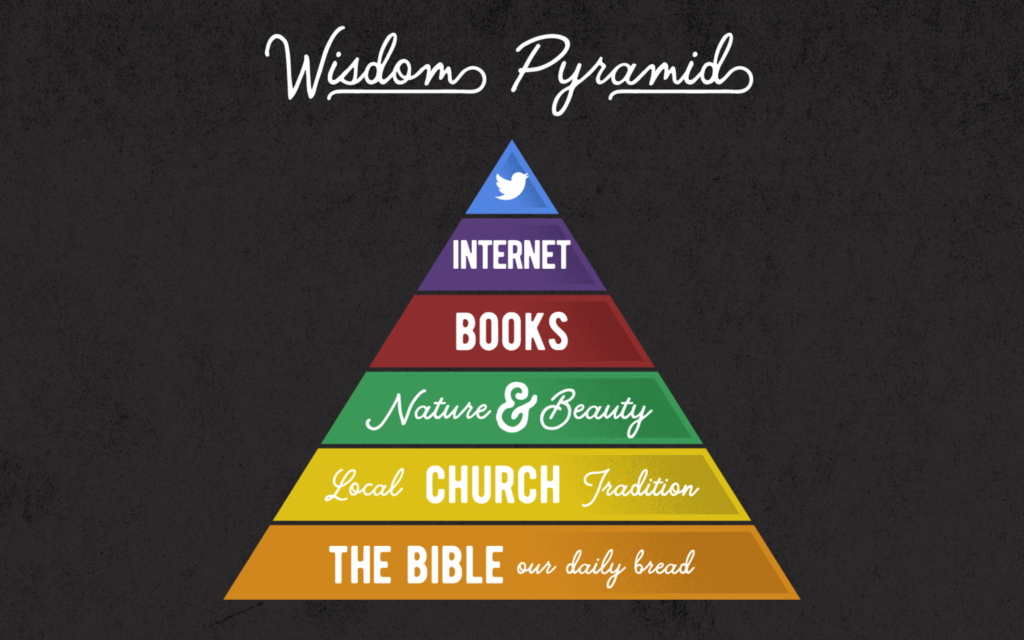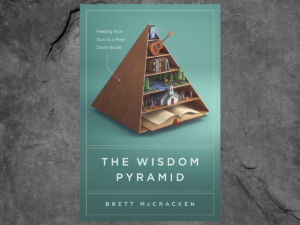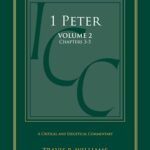The Wisdom Pyramid: A Review
Brett McCracken has written a helpful, short book on managing our information-overload world. He rightly notes that though we live in a world of exponentially increasing knowledge, such knowledge has not done much to make us wise.
The book breaks into two unequal parts. They are unequal both in terms of length as well as in (at least in my opinion) usefulness. The first section is shorter yet is substantially more weighty in meaty content. It develops the problems that have arisen in the modern world which have led to the present information age dystopia. Using a creative and apt metaphor of food intake, McCracken isolates three culprits which lead to informational sickness: 1) we eat too much; 2) we eat too fast; and 3) we eat only what tastes good to us.
Eating too much:
The first chapter addresses the first of our modern ailments; namely, we have informational gluttony. Such gluttony leads to sordid effects. First, we have anxiety and distress because of constant multitasking. Second, we have disorientation and fragmentation, accompanied by an inability to distinguish the important from the unimportant. Third, we have impotence, for the information age draws our attention to proximally distant issues which we are incapable of changing. Fourth, we have commitment paralysis, for our options are too many. Finally, we have confirmation bias, both self-chosen (i.e., because we have unlimited options, we can choose only to listen to our already determined perspective) and media-chosen (i.e., our apps and programs fine-tune our feeds to only present what we agree with).
Eating too fast:
The second chapter addresses the second of our modern ailments; namely, we have a need for perpetual novelty. This is not a bug of the modern internet age; rather, it is a feature. Consider one of Facebook’s co-founder’s comments on the thought process that led to the media platform. They were asking, “How do we consume as much of your time and conscious attention as possible? And that means that we needed to sort of give you a little dopamine hit every once in a while because someone liked or commented on a photo or a post or whatever.” Modern man is an addict, and media platforms provide the needed drugs. McCraken draws attention to the way that media is rewiring our brains so that we cannot have sustained attention.
Eating only what we like:
The third chapter addresses the third ailment; we are self-focused. Of course, the media age did not create this particular problem; nevertheless, it has exacerbated it. At no time in history has it been possible to design one’s own news intake, yet we are presently living in such a world. McCraken aptly likens the present to a person who must choose whether to eat pizza or vegetables. As we can tell from the obesity complex of our nation, most people will choose the former. The same occurs in the media realm. The choice between an informative and enriching article/interview/podcast, etc. will likely be passed over in favor of the media with the flashing lights, which promises that one will not have to leave a vegetative state, whether mentally or physically.
McCracken offers numerous solutions to these problems. The chief takeaway is his recognition that just as there is a “Food Pyramid,” so there should be a “Wisdom Pyramid” (see image below). And just as a balanced diet is necessary with food intake, so it is with information intake. The second section of the book (chapters 4–9) addresses each of these sources of information. The reading group I am a part of all agreed that though the second section was well-written, it lacked the incisive punch of the first section.

I have provided the broad outline of the book above, but within that outline McCracken shares quite a few wise tips. A few of which I am embracing: 1) never go online (e.g., Facebook, Twitter, Instagram, etc.) without a purpose, for the media company is trying to steal your time.; 2) stop trying to “maximize” my time. Often driving without the podcast on is more beneficial than with it on, for it gives me time to think; 3) focus my mental energy and emotional investment towards issues that are local, where I can actually expect to make a difference.
I am thankful for this book, and I am hopeful to use it in the future for my adult Sunday School class. It is a fitting study for our particular time.




Thank you for bringing attention to this helpful book! After reading it last month, I presented it already in two lessons (probably should have done it in three lessons). In the future, I plan on following up with a full lesson on each of the 5 levels of the pyramid. Actually, already started with the Bible by pausing to give a dozen or so lessons on Hermeneutics.